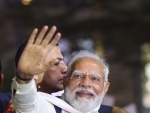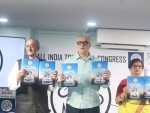
J&K: Fragmenting Ceasefire
At least seven Pakistan Rangers were reportedly killed in cross border firing by the BSF of India on October 21, 2016, in addition to one terrorist. According to reports, the Pakistan Rangers violating the CFA, carried out a sniper attack at an Indian post in the Hira Nagar area of Kathua District, injuring a BSF constable. A BSF released stated, "In a befitting reply to a sniper attack of Pak Rangers at 9:35 this morning in Hira Nagar Sector of Jammu, BSF launched an offensive. During intermittent firing of small arms and area weapons one terrorist and seven Rangers were shot dead." The Rangers had violated the CFA to help terrorists infiltrate from the Pakistani side into India, as has been the established practice over years. BSF spokesman Shubhendu Bhardwaj thus disclosed, "There was an infiltration attempt and sniper fire. We retaliated. The bodies are on the other side of the border." The injured BSF trooper died later, on October 22.
In the intervening night of October 19 and 20, 2016, Indian troopers foiled an infiltration attempt by terrorists in the Hira Nagar area of Kathua District. While one terrorist was killed the rest managed to escape back to Pakistan. Pakistan Rangers provided cover fire to the failed infiltrators.
On October 16, 2016, a soldier of the Indian Army was reportedly shot dead by a sniper from Pakistan. The incident occurred at a forward Indian post along the Line of Control (LoC) in the Naushera Sector of the Rajouri District. The Indian Army responded, though there was no report of any casualties on the other side.
The Indian Army had carried out a 'surgical strike' inside Pakistan occupied Kashmir (PoK) in the early hours of September 29, 2016, inflicting heavy casualties and damage to terror launch pads in the region. Unconfirmed reports suggest that at least 38 terrorists and their handlers, as well as two Pakistani soldiers were killed in the strike. No Indian casualty was reported. The 'surgical strike' was itself the Indian response to the attack on an Army camp at Uri in the Baramulla District of J&K on September 18, 2016, by Pakistan-based terrorists, which had resulted in the death of 19 Indian soldiers.
Since the 'surgical strike' of September 29, Pakistan has violated the CFA on at least 38 occasions, both along the LoC and at the International Border (IB), resulting in three deaths (all troops).
According to media reports, the continuous shelling along the border has resulted in a large migration of civilians from the affected areas to safer locations. Most recently, bullet proof vehicles were pressed into service overnight on October 21-22, to evacuate over 400 people because of Pakistani mortar bombing and firing in the border hamlets of Hiranagar in Kathua District.
The formal CFA, between India and Pakistan along the IB, LoC and the Actual Ground Position Line (AGPL) in J&K, began on the midnight of November 25, 2003. The Directors-General of Military Operations (DGMO) of India and Pakistan, in their weekly telephonic conversation, had agreed to the CFA. A joint statement of the Army Headquarters of both the countries declared,
Pursuant to the understanding between the Governments of India and Pakistan, the two DGMOs discussed the modalities of implementation of the proposal. It was mutually agreed that the ceasefire will be enforced between the two sides, along all the sectors of the IB, LoC and AGPL....
Pakistan was never willing to sign the CFA. But under immense pressure from several quarters, it did sign at a time when terrorism-related fatalities in J&K had started to decline. [The fatalities had started to decline since 2002. ]The Agreement held reasonably - though with rising exceptions over time - as long as President Musharraf remained in power in Pakistan, but disintegrated fairly quickly thereafter, as Pakistan sought to infiltrate increasing numbers of terrorists into J&K to shore up a terrorist movement that was rapidly losing steam. Fire cover provided by Pakistan Army and paramilitary units located across the border is essential to create opportunities for successful infiltration.
The first CFA violation on record took place on January 19, 2005, when mortars were fired from the Pakistani side across the LoC, targeting an Indian post in the Poonch sector, resulting in injuries to a girl. Officials then had claimed that the shelling may have been intended to provide cover to a group of infiltrators trying to sneak into the Indian side in the same District, of whom five had been killed a day earlier. The first fatality in Pakistani firing after the CFA, however, took place on November 25, 2007, when a soldier was killed, and another two were injured in two separate firing incidents from the Pakistani side along the LoC in the Poonch Sector.
According to partial data compiled by the Institute for Conflict Management (ICM) Pakistan has violated the CFA on at least 1,741 occasions since 2005. In 2005, Pakistan violated the CFA once, followed by three such violation in 2006, 21 in 2007, 77 in 2008, 28 in 2009, 44 in 2010, 62 in 2011, 114 in 2012, 347 in 2013, 583 in 2014, 405 in 2015 and at least 56 in 2016 so far (data till October 23, 2016). According to Government figures, there were 16 CFA violations by Pakistan between January and June 2016.
Despite the rising trends in incidents of CFA violation between 2005 and 2008, Pakistan failed to reverse the trend of declining fatalities in J&K. Perturbed, Pakistan upped the ante and such violations reached alarming levels in 2013, with a further escalation in 2014. Terrorism related fatalities in J&K, however, continued to decline, to bottom out at 117 in 2012, but have seen some augmentation since, with 181 killed in 2013, 193 in 2014, a dip to 174 in 2015, and a spike, again, to 218 in 2016 (till October 16). Pakistan has also continued to escalate tensions at the border through 2015 (till September).
According to Indian Government data, between 2012 and September 30, 2015, Pakistan has succeeded in infiltrating at least 300 terrorists into J&K. It is not surprising, consequently, that violence has surged during this period.
Since 2005, at least 4,178 infiltration attempts have been foiled by the Army at or close to the IB/LoC. In 2005, the Army foiled 597 attempts, followed by 573 such attempts in 2006, 535 in 2007, 342 in 2008, 485 in 2009, 489 in 2010, 247 in 2011, 264 in 2012, 277 in 2013, 222 in 2014, 121 in 2015 and at least 26 in 2016.
Alarmed by the rising volatility at the border, in a major development in September 2015, India's BSF and the Pakistan Rangers agreed to honor the November 2003 CFA to restore peace along the borders. At the end of four days of talks in New Delhi on September 12, 2015, the BSF and Rangers signed a 20-point 'Joint Record of Discussion' charting the future roadmap for cooperation between the two border Forces. Incidents of CFA violation registered a sharp decline after this. Overall fatalities in 2015 also declined marginally.
While the data for 2016 tends to buck the trend of a significant correlation between CFA violations and fatalities in J&K, it is useful to note that there has been a sharp decline in civilian fatalities, perhaps the most significant index of the consolidation of peace in the State. 2016 has seen just 10 civilian fatalities, the lowest number by far since the commencement of terrorism in J&K in 1988, and half the number killed in 2015. Meanwhile, terrorist fatalities have risen to 137 till October 16, 2016, from a total of 113 in 2015, and account for almost 63 per cent of fatalities recorded this year. There has also been a spike in SF fatalities, at 71 this year, thus far, as against 41 in 2015, indicating a far greater fury in armed engagements, overwhelmingly along the LoC and IB, as against soft-target terrorism deeper within the State.
The BSF and Pakistan Rangers met again in Lahore (Pakistan) from July 25-28, 2016, and reiterated their commitment to the CFA. However, though CFA violations declined after the September 2015 meeting, Pakistan backed terrorism in J&K has registered a significant increase. Some incidents have also spilled over into neighbouring Punjab. A major attack took place at Indian Air Force Base at Pathankot in Punjab in January 2016, resulting in the death of seven soldiers. Earlier, in July 2015, Pakistan-backed terrorists had attacked the Dinanagar Police Station in Gurdaspur in Punjab, killing seven before the three attackers were also killed.
In the deadliest attack on the Indian Army in J&K in terms of fatalities among personnel, at least 19 soldiers were killed by Pakistan-based terrorists in Uri on September 18, 2016. The 'surgical strike' was India's response to this grave provocation.
Islamabad appears to have seized upon the 'surgical strikes' to legitimize a collapse of the CFA, which has long been thought by the Inter Services Intelligence (ISI) as working to the advantage of New Delhi. Though Pakistan continues to deny (albeit somewhat inconsistently) the 'surgical strikes' in PoK, it is evident that its Army is chafing under the humiliation that has been inflicted on it. A continuous escalation, and the possibility of a major 'retaliatory' strike, therefore, remains likely in the foreseeable future.
Support Our Journalism
We cannot do without you.. your contribution supports unbiased journalism
IBNS is not driven by any ism- not wokeism, not racism, not skewed secularism, not hyper right-wing or left liberal ideals, nor by any hardline religious beliefs or hyper nationalism. We want to serve you good old objective news, as they are. We do not judge or preach. We let people decide for themselves. We only try to present factual and well-sourced news.







